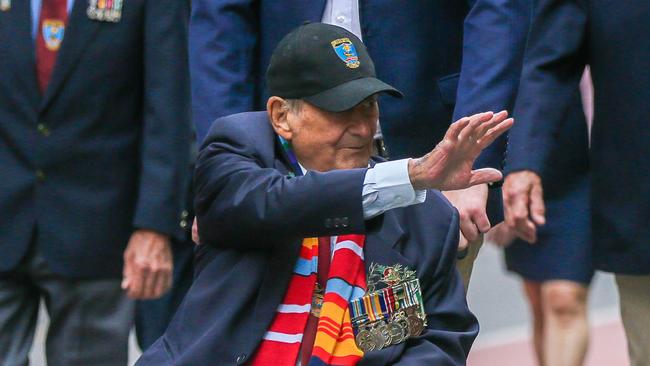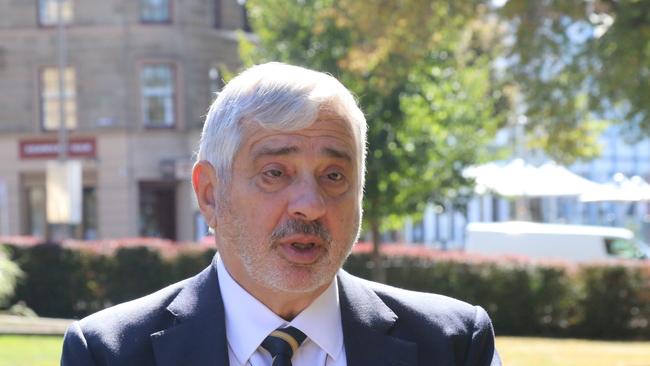NDIS demand pushes veterans down mental health queue
Veterans are being forced onto long waiting lists to get mental health support.

Veterans are being forced onto months-long waiting lists to get mental health support under a rebate system that pays at least $61 less per session to treat former Australian Defence Force members than NDIS clients.
As the nation marks 50 years since Australia’s involvement in the Vietnam War ended, RSL national president Greg Melick said many veterans were struggling to get psychological help due to the funding disparity.
Psychologists providing counselling to National Disability Insurance Scheme clients receive a minimum of $214 an hour, but can charge even higher rates to self-managing NDIS participants who have discretion over the fees they pay from their taxpayer-funded care plans. The Department of Veterans Affairs pays psychologists $153 a session to see former ADF members.
Major General Melick (retired) urged the Albanese government to “level the playing field” to support veterans suffering mental health difficulties. “One way of recognising and honouring our veterans would be to ensure that payments for mental health treatment are at least equal to those available under NDIS,” he said.
Major General Melick said Vietnam veterans had been treated particularly badly, facing taunts of “baby killer” and “murderer” when they returned home. “There was not even a welcome home parade until 1987,” the RSL president said. “It took a long time to recognise their mental-health issues were exacerbated by the treatment they received.”
He said the government needed to ensure the availability of appropriate mental health treatment for all veterans suffering from such issues. His comments follow interim findings from the Royal Commission into Defence and Veterans Suicide demanding an overhaul of legislation governing veterans’ compensation and rehabilitation entitlements. “The current framework, which is premised on a compensation model, should be replaced with a wellbeing model, which incorporates concepts of social insurance more aligned with the National Disability Insurance Scheme,” the report said.

Psychologist Valerie van Loggerenberg, who specialises in providing services for veterans, said the payment imbalance had left many mental health practitioners feeling discouraged. Dr van Loggerenberg pointed to guidance from peak bodies suggesting psychology practices needed to charge a consultation rate of $300 an hour – nearly double the DVA-approved rate – to be sustainable.
“If we want to have people working with veterans over the longer term, we need to provide some sustainable living for those of us who work with veterans,” Dr van Loggerenberg said.
She said many psychologists she knew had taken up NDIS clients because they attracted higher consultation fees.
Dr van Loggerenberg said she was unable to manage a patient waiting list as a sole practitioner, but was aware of some psychology practices that had waiting lists for veterans to 2024.
Australian Association of Psychologists executive director Tegan Carrison said her members had significant financial strain, forcing them to drop lower-paying clients including veterans.
“We are concerned that the low psychologist rates via DVA have already reduced, and will continue to reduce, the supply of skilled psychologists who can work effectively with veterans and their families,” she said.
The Australian Psychological Society, said: “Too many veterans are unable to access psychological care due to this chronic underfunding.”
Opposition veterans’ affairs spokesman Barnaby Joyce said the Coalition had been working on a plan to align Medicare, aged care, NDIS and veterans’ payments before it lost last year’s election. He said there was a market distortion inherent in the NDIS model that allowed its recipients to out-bid veterans for services such as psychology.
“The interim report of the royal commission was handed down exactly one year and one week ago. That report made it clear that the government needed to urgently consider how to align veterans benefits with the NDIS model,” Mr Joyce said.
“No action has been taken. And as a result, the mental health issues of many veterans are being exacerbated as they see themselves pushed down the priority list for services because an NDIS patient, in many cases, has the flexibility to pay more for a consultation or service”.
Veterans’ Affairs Minister Matt Keogh said: “There is no doubt that veterans, like the general population, can face difficulty finding available psychologists. The … government is working to address these health workforce shortages more broadly, however more than 4000 psychologists have provided over 280,000 sessions of support to veterans every year in addition to the supports provided through OpenArms.”
Anthony Albanese apologised to Vietnam veterans this year for the nation’s failure to honour them when they returned home, announcing commemorative medallions to mark their service.
If you or a family member needs help, contact: Suicide Call Back Service 1300 659 467; Lifeline Australia 13 11 14; Open Arms 1800 011 046; Defence All-hours Support Line 1800 628 036








To join the conversation, please log in. Don't have an account? Register
Join the conversation, you are commenting as Logout